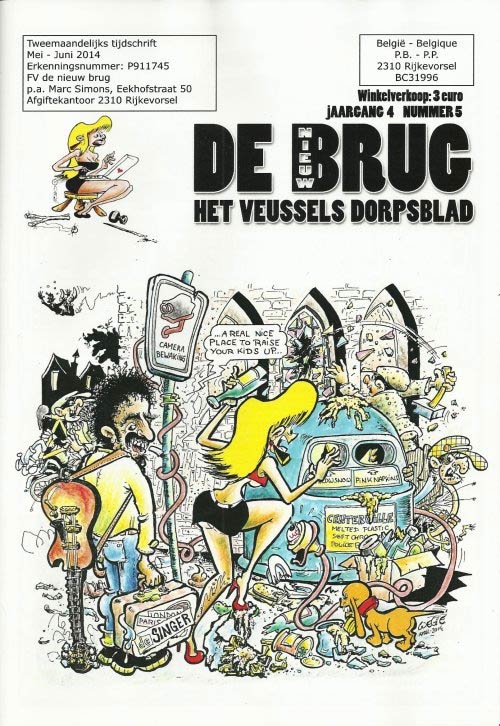WEgé is the pen name of the Flemish comic artist Willy Geets. He is best known for his unemployed comic hero 'Tistjen Dop' (1979-1987), and for the many cartoons and comic strips he has made for local papers from his hometown Rijkevorsel. One of these is 'Suske Wiet', co-created with Yaack Bakker; for the monthly magazine De Brug.
Early life and comics
Willy Geets was born in 1954 and grew up reading Willy Vandersteen's 'Suske en Wiske' and most notably Marc Sleen's 'De Lustige Kapoentjes' and 'Nero'. As a child he read his comic books until they lost their covers, which inspired him to recreate the missing parts. He had the ambition to become a comic artist himself, and applied for a job at Studio Vandersteen. However, Vandersteen had no vacancy, and Geets enrolled at the Academy of Ghent, where he studied graphic arts. He had his first job at a printing firm, and started making comics on the side. His first published comic strip was the gag strip about the bird 'Kartoffel' (1975). It appeared in Jan Smet's comics news magazine CISO Stripgids and also in Ekspres, a free local magazine from Turnhout.
'Kartoffel'. Translation: "They've been working hard down there, this week. They made a "red square". Hey, and there comes a guy in white. And there too. What are they up too? WOK! Tennis..."
Tistjen Dop
After fulfulling his military service and losing his job, Geets was approached by Walter van den Broeck, editor of the weekly magazine Ekspres, to make another comic strip for them. Geets had already developed a comic inspired by his own experiences with unemployment, resulting in the creation of 'Tistjen Dop' ("doppen" is a Flemish expression for receiving unemployment pay). The character debuted in Ekspres in 1979, and continued to appear until 1987. The publishing house Zinje collected the comic in four albums: 'Van De Kaart!' (1983), 'Op Zwart Zaad' (1984), ''t Is Geen Werk' and 'Van de Regen in de Drop' (1986). During the 1980s, Geets reached over a million readers when 'Tistjen Dop' appeared in De Volksmacht, the magazine of the Christian Workers' Movement. The comic was also published in publications of the Communist and socialist parties, and in a newspaper for the unemployed. WEgé based his gags on the news of the day and ended his comic after about ten years because of lack of further inspiration. The character lives on in the comic book store Tistjen Dop, opened by Ad Hendrickx in 1986. At the occasion of the store's thirtieth anniversary in 2016, Hendrickx released another album with previously unpublished gags, 'De Verloren Episodes'.
'Suske Wiet', with guest appearance of Merho's 'Kiekeboe' (1998).
Suske Wiet
Since the 1990s WEgé is the house cartoonist of the monthly magazine De Brug (since 2011 retitled De Nieuwe Brug), which circulates in Rijkevorsel, where the artist nowadays resides. Together with Yaack Bakker, he created the comic strip 'Suske Wiet', a fictional inhabitant of the community. The strip is notable for its guest contributions by Erika Raven and Merho in 1998.
Recent years
WEgé makes posters and promotional artwork for local events. He regularly adds cameos of his musical hero Frank Zappa in his artwork. When Marc Sleen passed away in 2016 he was one of many celebrities to attend his funeral.
Cover for De Brug, with Frank Zappa reference. The line "A real nice place to raise your kids up" is a reference to Frank Zappa's song 'Centerville' from his album/film '200 Motels' (1971).
www.tistjendop.be
Wouter Adriaensen's interview with Willy Geets and Yaack Bakker






